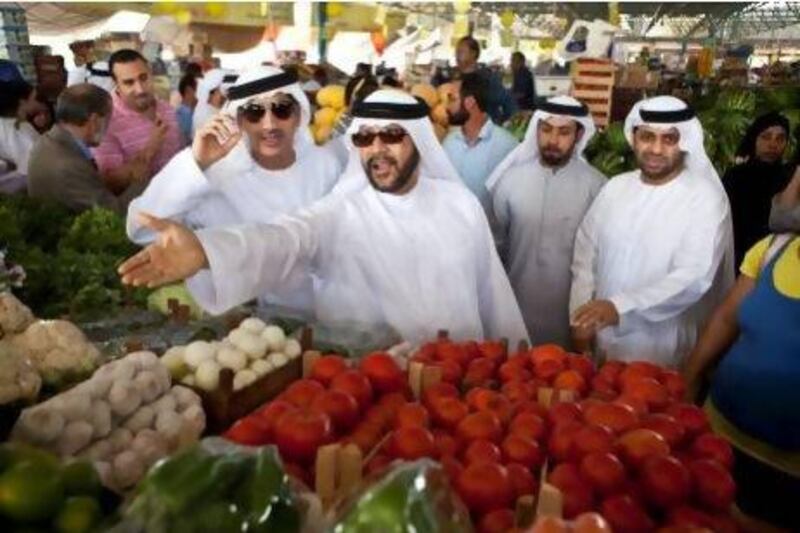DUBAI // Rules to keep food prices low for Ramadan coupled with unrest across the Middle East are leaving traders out of pocket, according to officials from the Department of Economic Development.
The extra cost of importing goods from further afield because of the fighting in Syria and problems in Lebanon means prices at Dubai's fruit and vegetable market are higher than usual.
"With the crisis in Syria and Lebanon there is a shortage, so now they have to go through Cyprus from Lebanon to get their produce and it's at least 10 per cent more expensive," said Jassem Thani, the manager of complaints for customer rights at the Department of Economic Development (Ded).
But staff from the Ministry of Economy who toured the market in Al Aweer yesterday insisted that prices must come down for the duration of the holy month.
Almost every trader visited by Dr Hashem Al Nuaimi, the ministry's head of consumer protection, was told to drop prices.
At one stall, 8 kilograms of tomatoes was reduced from Dh23 to Dh20. At a neighbouring stall, a pineapple was reduced from Dh5 to Dh2.
"The prices are still much better than last year and all the items are available," he said. "I'm happy with the outcome."
The recent price rises have not gone unnoticed by customers.
"Prices have gone up this year," said Ibrahim bin Karam, an Emirati. "One stall was selling four melons for Dh70 when it's Dh30 next door."
Mr Thani said it was important prices were controlled during Ramadan, but a balance had to be found.
"They're selling their produce far too cheap. Dh1 is not a profit, the ministry should think about the cost of shipping, this is absolutely wrong," he said.
"The demand is also very high for Ramadan so, although we will control prices, the ministry must be reasonable.
"If I feel there are some abnormal prices going on or people taking advantage of Ramadan and the crisis, we won't allow them."
At one stall, 10 pineapples were being sold for Dh38. Half of them were found to be expired.
"He's going to have to throw them away," said Abdulaziz bin Hathboor, the Ded's director of consumer protection. "We're thinking of retailers and customers.
"We're looking at the reasons why there is an increase in prices and this is because of the crisis, the international market and the local cost of services has increased, too."
The hot weather is another problem for traders.
"These people are at risk with this weather, they lose a lot of goods through spoiling because of the heat and because they are sensitive items," Mr Thani said. "They're losing 25 per cent of their goods that they paid from their own pocket, so how will they cover their losses?
"They opened a business, not a charity and we have to think of that."
Sixteen fines of Dh5,000 and above were issued to stallholders who displayed high prices or no price tags on food during the ministry's visit.
Some traders welcomed the tough stance.
"They've increased their prices," said Khader Al Qawasmi, the owner of Al Qawasmi Fruits and Vegetable Trading. "They need tight rules to make sure prices stay low."
Dr Al Nuaimi urged consumers to call the ministry's hotline on (04) 600 5555 if they have complaints.
"We will stay here for four days to make it easier to communicate with customers, but our inspectors will come back later during Ramadan," said Ahmed Ennaji, the ministry's manager of consumer rights.






